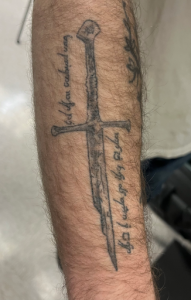Change the Culture
March 5, 2018
Gender is an abstract concept. It holds a set of social boundaries, yet still remains subjective and expressive. The Eaglecrest population flourishes with students that break the boundaries of being masculine or feminine and with those who are comfortable with their gender identity and a sense of fluidity.
Kurtis Buzick, a student of an abstract and witchy wardrobe, believes that gender roles are implemented at birth.
“They give you a pink or blue blanket,” He began. “It’s the baby pink decorations, or the baby blue walls.”
Buzick describes the feminine incline he had as a child despite societal standards. He recalls asking his mother for a pair of glass slippers at age six. He found interest in the elegant disney heels, his favorite movie at the time being Cinderella.
“I simply thought [the glass slippers] were beautiful.” He said. “I remember thinking: Why can’t young boys be beautiful too?”
This curiosity has allowed many students to openly explore gender and question the masculine and feminine boundaries. Eaglecrest offers Club Spectrum, an open community dedicated to discussing what is going on in the LGBTQ+ community around the world. It is a perfect resource for any students struggling with their gender identity.
“Normality is toxic.” Explained spectrum member, Ben Johnson. “As a community, I believe that we should be open minded for those who are so willing to be themselves.” She adds.
Johnson, among many others, recall negative experiences relating to others opinions on identity.
“I was getting bullied constantly for identifying as female.” She said, Johnson believes in the right to openly explore the concept of self
Owen Shriver, fellow spectrum member, added to the discussion.
“There is a personal obligation and outside pressure to present as your gender publically.” Shriver commented.
Buzick tends to find social complications in day-to-day living. Through simple acts like grocery shopping, Buzick has been approached harshly. He advises those with a lack of understanding to mutually respect his choices just as he respects theirs. He states that there is a certain liberation that comes with personal expression, this providing no excuse to take away this freedom.
“I may not believe in what you believe in, but I believe in your right to express.” He stated.
Barbara Edwards, school psychologist, considers herself an advocate and resource for those struggling with gender identity. As some students may not be able to express themselves at home, Edwards believes that the school should be open to the concept of gender identity. She is always available in the dean’s office by appointment.
“Unhealthy behaviors begin If [students] are not able to express who they are meant to be.” Edwards began.
She continued to discuss what we, as students and staff, can do to welcome students that have hardships with gender. Above all, she stresses to be there and ask for further understanding and clarification. For example, it is acceptable to ask for one’s pronouns in a respectful manner.
“It is important to have somebody. Don’t be afraid, and spread awareness,” Edwards said.







